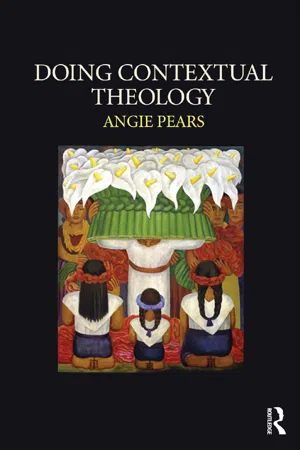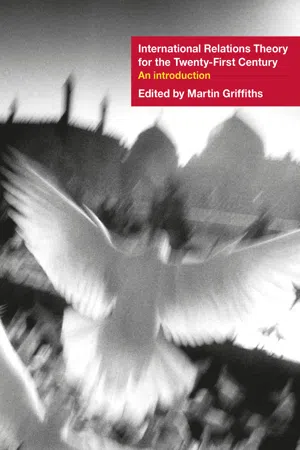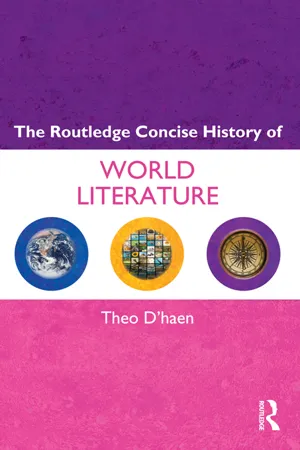Postcolonial Literary Theory
Postcolonial literary theory examines the cultural, social, and political impact of colonialism and imperialism on literature. It focuses on the representation of colonized peoples, the effects of colonization on language and identity, and the ways in which postcolonial writers challenge and subvert dominant narratives. This theoretical framework seeks to decolonize literary studies and highlight marginalized voices.
7 Key excerpts on "Postcolonial Literary Theory"
- eBook - ePub
Postcolonial Theory
A critical introduction
- Leela Gandhi(Author)
- 2020(Publication Date)
- Routledge(Publisher)
...8 Postcolonial literatures The contesting themes of nationalism and postnationalism which we have been discussing govern the critical concerns of Postcolonial Literary Theory. It is to this specialised branch of postcolonialism that we will now direct our attention. Despite its interdisciplinary concerns, the field of postcolonial studies is marked by a preponderant focus upon ‘postcolonial literature’—a contentious category which refers, somewhat arbitrarily, to ‘literatures in English’, namely, to those literatures which have accompanied the projection and decline of British imperialism. This academic privileging of postcolonial literature is informed by recent critical attempts to postulate the colonial encounter primarily as a textual contest, or a bibliographic battle, between oppressive and subversive books. Following the impact in the mid-1980s of ‘ cultural materialism’ upon literary theory, critical practice has been urged to concede the material underpinnings of all culture. Texts, as is now commonly agreed, are implicated in their economic and political contexts. Few critics would dispute the understanding that all literature is symptomatic of, and responsive to, historical conditions of repression and recuperation. While Postcolonial Literary Theory invokes these cultural materialist assumptions in its account of textual production under colonial and postcolonial conditions, it goes a step further in its claim that textuality is endemic to the colonial encounter. Texts, more than any other social and political product, it is argued, are the most significant instigators and purveyors of colonial power and its double, postcolonial resistance. Thus, as Chris Tiffin and Alan Lawson insist: ‘Imperial relations may have been established initially by guns, guile and disease, but they were maintained in their interpellative phase largely by textuality’ (Lawson & Tiffin 1994, p. 3)...
- eBook - ePub
The Empire Writes Back
Theory and Practice in Post-Colonial Literatures
- Bill Ashcroft, Gareth Griffiths, Helen Tiffin(Authors)
- 2003(Publication Date)
- Routledge(Publisher)
...5 Re-Placing Theory Post-colonial writing and literary theory DOI: 10.4324/9780203426081-6 Post-Colonial Literatures and Postmodernism Post-colonial writing and literary theory intersect in several ways with recent European movements, such as postmodernism and poststructuralism, and with both contemporary Marxist ideological criticism and feminist criticism. These theories offer perspectives which illuminate some of the crucial issues addressed by the post-colonial text, although post-colonial discourse itself is constituted in texts prior to and independent of them. As many post-colonial critics have asserted, we need to avoid the assumption that they supersede or replace the local and particular (Soyinka 1975). But it is also necessary to avoid the pretence that theory in post-colonial literatures is somehow conceived entirely independently of all coincidents, or that European theories have functioned merely as ‘contexts’ for the recent developments in post-colonial theory. In fact, they clearly function as the conditions of the development of post-colonial theory in its contemporary form and as the determinants of much of its present nature and content. Despite the recognition of this relationship, the appropriation of recent European theories involves a number of dangers, the most threatening of which is the tendency to reincorporate post-colonial culture into a new internationalist and universalist paradigm. This incorporative practice is shared by both the apparently apolitical and ahistorical theories of poststructuralism and the socio-cultural and determinist theories based in contemporary Marxist thought. Conversely, it is arguable that dominant European movements, such as postmodernism, which have sought in recent times to reabsorb post-colonial writing into an international postmodern discourse, may themselves, in fact, be more indebted to the cultural effects of the material practice of colonization and its aftermath than is usually acknowledged...
- eBook - ePub
- Angie Pears(Author)
- 2009(Publication Date)
- Routledge(Publisher)
...Like Marxism and feminism, though, it has evolved in response to political and historical issues of vast importance and scope, such as anticolonial militancy, and its deeper origins and many of its ends lie outside academic study. (Harrison, 2006:9) The origins of postcolonial theory can be traced to literary theory or more generally to the study of English literature. From this its significance to other disciplines and to understanding human life generally became apparent. The starting point of postcolonialism is colonialism and imperialism and the resultant impact on the way in which people and communities were represented and discourses developed. Whatever the perspective taken on the state of a particular country or a territory, postcolonialism is concerned with power, rule and developing independence and challenging dependency. Postcolonialism also focuses on representation, on the way in which various groups or people are represented through discourse. Postcolonial theory has focused on the power differentials at work in representation and on challenging those representations if it is deemed necessary. In short, then, the roots of postcolonial theory lie in the academic discipline of English literature, and in particular of textual and discourse analysis. However, the possibilities that it has offered as a tool and as a way to contribute to the ever-growing field of challenging colonialism and imperialism, even when on the surface imperialism and colonialism were in many cases no longer visibly in place, became apparent very quickly. Scholars from other disciplines, and very importantly non-academics, began to use the mechanisms of postcolonialism to analyse and critique different situations and different experiences. From a theological perspective the meaning of the term ‘postcolonial’ can be accessed through the concise description given by the biblical scholar, R.S. Sugirtharajah...
- eBook - ePub
Using Critical Theory
How to Read and Write About Literature
- Lois Tyson(Author)
- 2020(Publication Date)
- Routledge(Publisher)
...Chapter 9 Using concepts from postcolonial theory to understand literature Why should we learn about postcolonial theory? If you’ve read the preceding five chapters, you’ve seen some of the ways in which concepts from psychoanalytic, Marxist, feminist, LGBTQ, and African American theories focus our attention on different aspects of human experience. Specifically, you’ve seen some of the ways in which our relationship to ourselves and our world is formed by our psychological wounds, by the socioeconomic class into which we were born and to which we now belong, by the capitalist system within which we were raised, by traditional gender roles, by our sexual orientation, by our gender identification (our internal sense of our own gender, which may or may not match our apparent biological sex at birth), and by our race. Postcolonial theory gives us tools to explore how all of these factors—as well as ethnicity, religion, customs, education, disability, age, and other cultural factors that influence human experience—operate together or in conflict to create the ways in which we view ourselves and our world. Thus, concepts from postcolonial theory can help us understand human experience as the interaction of complex cultural forces working in each of us. Postcolonial theory developed the concepts we’ll study in this chapter because, as its name implies, this theory emerged in an attempt to understand people from different cultures in terms of an important experience they all had in common: colonial domination by a superior European military force. Europe’s invasions of non-European peoples began at the end of the fifteenth century with the military competition among England, France, Spain, Portugal, and the Netherlands to find new sources of wealth around the globe...
- eBook - ePub
Theory in Social and Cultural Anthropology
An Encyclopedia
- R. Jon McGee, Richard L. Warms(Authors)
- 2013(Publication Date)
- SAGE Publications, Inc(Publisher)
...Martha Kaplan Martha Kaplan Postcolonial Theory Postcolonial theory 635 639 Postcolonial Theory Postcolonial theory addresses the effect of colonialism on culture. Initially associated with literary analysis, in the 1970s, postcolonial theory focused first on Western colonial discourse, showing that colonial power took shape in areas of life such as literature, which are not initially obviously political. But other founding contributors to postcolonial theory, especially historians, urged the study of the histories of colonized people and their experience of colonialism. Anthropology’s and history’s engagement with postcolonial theory has broadened attention to the agency of the colonized, to resistance, and to postcolonial consequences. Cultural anthropology and postcolonial theory share many analytic and reflective questions. As postcolonial theory extended its moral and political challenge, it provoked anthropologists and historians to question whether their fields, like literature, had underestimated colonialism, overestimated Western culture to be universal, and neglected colonial domination and its effects. While anthropologists have long been champions for others and skeptics of the West, and its ethnocentrism and racism, until the rise of postcolonial theory, they had not developed a sustained critical inquiry into colonial processes. But anthropology also offers challenges to unexamined assumptions in postcolonial theory. In particular, anthropology questions the periodization implied in the term postcolonial, which implies an open-ended era defined by past Western domination. Most important, anthropologists have identified new ways to think about and name the postcolonial era, including a focus on nation-states, decolonization, globalization, and plural modernities. Orientalism and Subaltern Studies Postcolonial theory began with scholarship on colonial era texts...
- eBook - ePub
International Relations Theory for the Twenty-First Century
An Introduction
- Martin Griffiths, Martin Griffiths(Authors)
- 2007(Publication Date)
- Routledge(Publisher)
...To a significant extent, then, postcolonialism has begun to answer the challenge to move away from a politics of theory toward a new theory of politics where ‘the accent is on political rather than cultural criticism’ (Scott 1999:19). This of course does not mean that postcolonial perspectives have abandoned the attention to the past or to the power of representation or that they can be subsumed under one uniform banner, espousing the same theories and the same politics of resistance. The heterogeneity of postcolonialism remains its key distinguishing feature, but its political edges are perhaps becoming more discernible as authors increasingly turn to contemporary issues and challenges. Conclusion Postcolonial theory is a relatively new entrant to IR, but in the space of a few years writers working within this mode of analysis have both challenged conventional perceptions and made considerable contributions to our understanding of contemporary IR. In particular, postcolonial approaches have helped make the countries and peoples of the South more visible in IR, drawing attention to the inadequacies and silences of Western-centric forms of analyses. By critiquing the state-centric foundations of much IR theory, postcolonial investigations have stressed the interconnectedness of the North and the South and the continued importance and political relevance of their mutually constitutive relationships. As such, they have gone some way toward expanding the dialogue in IR and including previously excluded Third World perspectives ‘among the global voices clamouring to be heard in a discipline in flux’ (Rosenau 1993: xv). Nevertheless, postcolonial theory remains on the margins of IR. As a heterogeneous, critical perspective questioning dominant interpretations and focusing primarily on the powerless, it is unlikely to command the same kind of influence and status as perspectives concerned with the interests and actions of core states...
- Theo D'haen(Author)
- 2013(Publication Date)
- Routledge(Publisher)
...7 World Literature, (Post)Modernism, (Post)Colonialism, Littérature-Monde Overview In the early 1990s the well-known postcolonial critic Homi Bhabha proposed that postcolonial literature might be the new world literature. For him the literature of the displaced, the exiled, the uprooted, the marginalized, more accurately reflected the state of the present-day world than the postmodern literature produced by so-called mainstream literatures in the West. In reality, the division between postcolonialism and postmodernism is not so clear-cut. In fact, many contemporary writers may be seen to fit both categories. Moreover, most of the writers that would fit Bhabha’s postcolonial category write in the language of the former colonizer or the present-day hegemon.This raises the question whether the postcolonial as commonly conceived of in present-day literary studies, rather than an alternative to “Western” literature, is not simply one more projection of that same Western hegemony in matters literary, theoretical as well as practical. If such issues have increasingly come to the fore in Anglophone literary criticism, they have been much less debated in other languages. Very recently, though, the issue has erupted also in French-language literature with a much-noted manifesto in a leading Parisian daily, followed by a collective volume. Postcolonial Literature as World Literature In his introduction to Locations of Culture (1994) Bhabha cites Goethe’s remarks in the latter’s introduction to Thomas Carlyle’s Life of Schiller (1830) that through the Napoleonic Wars nations had become aware of “much that was foreign” and conscious of “spiritual needs hitherto unknown” (Strich 1949: 351; Bhabha cites another, older translation, viz. that by Joel Spingarn [1921], which gives the same passages as “many foreign ideas and ways” and “previously unrecognized spiritual and intellectual needs,” Bhabha 1994: 11)...






